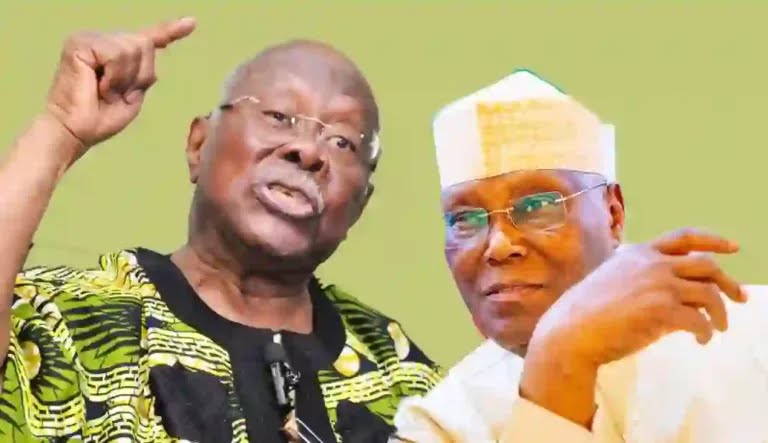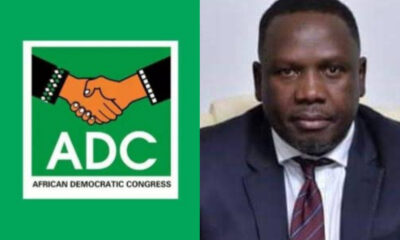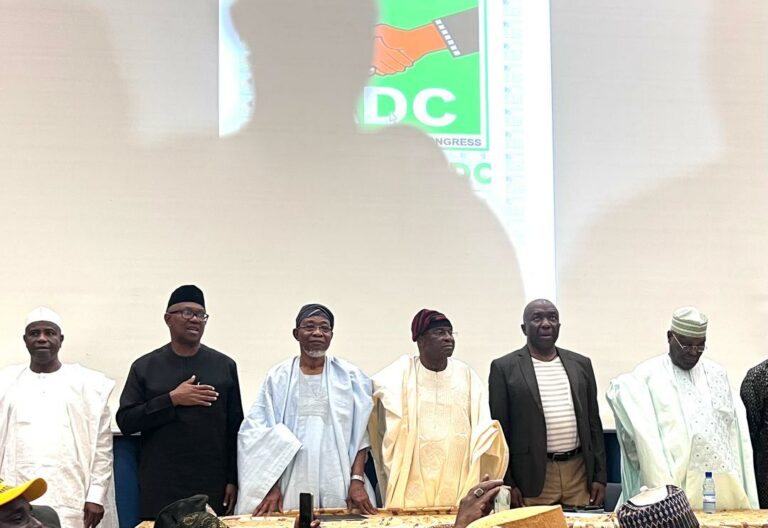Former Vice President Atiku Abubakar, 2023 Labour Party presidential candidate Peter Obi, former Senate President David Mark and other coalition leaders have formally adopted the African Democratic Congress as the platform to lead efforts to defeat President Bola Tinubu in the 2027 election.
At the unveiling, which took place on Wednesday at the ADC coalition members at Yar’Adua Centre in Abuja, Mark and former Osun State Governor Rauf Aregbesola were announced as the interim National Chairman and Secretary of the ADC, respectively.
Meanwhile, ADC’s 2023 presidential candidate, Dumebi Kachikwu, along with other members of the party’s previous faction, criticised Atiku, Obi, and others, accusing them of hijacking the party and questioning their ability to lead.
In a separate reaction, PDP Acting National Chairman, Umar Damagum, insisted that the party remains united and warned that any members undermining the PDP under the guise of a coalition would face consequences.
The All Progressives Congress dismissed the opposition leaders, describing them as retired politicians unwilling to step aside, and maintained that the ruling party would easily defeat them in 2027.
Amid growing public discontent over Tinubu’s economic reforms, the opposition is seeking to form a united front to challenge him in the next presidential election.
In preparation for the 2027 election, prominent opposition leaders unveiled a new political coalition in Abuja on March 20. This move triggered widespread discussions about the possibility and strength of a united opposition.
The PUNCH had exclusively reported on May 19 that the ADC had been selected as the coalition’s official political platform.
In his acceptance speech, the interim National Chairman of the ADC, Mark, acknowledged the uphill task ahead for the coalition’s attempt to unseat Tinubu.
“Let it be known to all that this coalition of national political opposition groups goes beyond gaining political power. It is a concerted effort to rebuild the crumbling pillars of Nigeria’s democracy.
“Today marks the beginning of what we believe will be a long, difficult and tedious journey. However, it is a journey that we are prepared to undertake, united in our collective belief that no price or sacrifice is too high in the service of our fatherland,” he said.
The ADC interim chairman accused the current administration of capturing key democratic institutions and warned that the country is drifting toward full-scale civilian dictatorship.
He said, “The blatant destabilisation and infiltration of all major opposition political parties is aimed at achieving only one objective, to enhance total state capture and leave Nigerians with no alternative or options in 2027. This coalition is to prevent our country’s descent into a one-party state.
“We have never seen a government so much at home with corruption, a government that disdains accountability in all ramifications. A government more concerned with the next election rather than the survival of the ordinary Nigerians.
“A government so totally consumed with politicking that governance is abandoned, while the majority of our people wallow in hunger and poverty.
“We have never seen this level of insecurity across the length and breadth of our nation. Bandits and kidnappers kill Nigerians at will and on a daily basis. Yet, this ongoing tragedy has not moved the government to any action that would stop these mindless killings and stem the tide of needless bloodshed.”
Mark stressed that Nigerians deserve a government that guarantees their safety and allows them to feel secure in their homes.
He added, “Equally disturbing is the total emasculation of the legislative institution. Never in our history have we witnessed a National Assembly where legislators, the trustees of the very bastion of our democracy, saddled with the sacred duty to protect Nigerians from misuse of executive power, are reduced to cheerleaders and praise singers of the President, head of the executive arm.
“Without doubt, the transformation of Nigeria’s National Assembly to a mere appendage of presidential authority is a dangerous conspiracy against the Nigerian people.
“It is the reason why the government can get away with various whimsical, unconstitutional policies and actions or inactions that have reduced more Nigerians to abject poverty and widened the boundaries of insecurity and fear.”
The ADC interim chairman accused the APC-led government of disregarding the sacrifices of Nigeria’s founding leaders and emphasised that the coalition belongs to all Nigerians.
He said, “This coalition is determined to offer Nigerians a path to security, prosperity, peace and progress. Coming from various party affiliations, we are united in our resolve to present a constructive alternative to the hardship, insecurity and waste that has become the hallmark of the current APC government.
“As we proceed this day, we acknowledge the practical implications of imminent bye-elections and one state governorship election for some of our coalition partners in their respective legacy political parties. However, all of us remain firmly united under the ADC banner for the 2027 general elections and beyond.”
Earlier, the founding National Chairman of the ADC, Ralph Nwosu, stated that party leaders willingly resigned to allow Mark and Aregbesola to lead the efforts to reposition the party and the nation.
Nwosu said, “We all decided to resign so that Mark, Aregbesola and others can lead us to the (Presidential) Villa. We also approved Mark as National Chairman and Aregbesola as the National Secretary of the party. When you look at the two of them and their commitment to this country, you’ll see that this is a new beginning. They will reposition the party and Nigeria.”
Nwosu emphasised that the coalition’s goal is not merely about seeking power but advancing Nigeria’s “global reckoning.”
“ADC has always been about the rejuvenation of Nigeria and Africa. This journey started about 18 months ago, and we have had over 12 NEC meetings.
“When we were consulted, we said we have also been consulting because we are a party that believes in coalition. A day like this shows that we are ready to sacrifice anything for Nigeria. We don’t have any doubt in the man; we all have decided to resign.”
After the unveiling of the ADC interim leadership, former transport minister Rotimi Amaechi criticised the government’s handling of the economy, saying inflation had reached unprecedented levels and many Nigerians were unable to afford basic food.
He disclosed that he had resigned from the APC the previous night and expressed surprise he wasn’t expelled earlier, noting he had long warned the party against inviting him to its meetings.
The former Rivers State governor said, “No, it’s not about changing the government, if it is about changing the government, there is no need to change the government, it’s about changing Nigeria.
“Nigeria is destroyed. People can’t eat. People can’t buy food. There’s no money to buy food. Everything is gone. Inflation is at its peak. And the federal government is busy going around trying to hijack the election. INEC is helping them to hijack the election.
“No, no, no. What must happen here is that we must start not just a party, but a movement, it must be a movement that brings in Nigerians to, on their own, take over government, not us.”
Among those present at the unveiling were the 2023 presidential candidates of the Peoples Democratic Party, Atiku Abubakar; the Labour Party, Peter Obi; and Aregbesola.
Also in attendance were former National Chairman of the All Progressives Grand Alliance, Victor Umeh; former PDP National Chairman, Prince Uche Secondus; Labour Party’s 2023 Vice Presidential candidate, Datti Baba-Ahmed; former APC National Chairman, John Odigie-Oyegun; and former Inspector-General of Police, Mohammed Abubakar.
Other attendees included former Governors Nasir El-Rufai, Rotimi Amaechi, Gabriel Suswam, Abdulfattah Ahmed, Aminu Waziri Tambuwal, Oserheimen Osunbor, Celestine Omehia, Liyel Imoke, Window Jibrilla, Emeka Ihedioha, Capt. Idris Wada, former Ondo Deputy Governor Agboola Ajayi, former Ekiti Deputy Governor Kolapo Olushola, and Kogi State Deputy Governor Simon Achuba.
Also present were former Attorney General of the Federation Abubakar Malami, former Secretary to the Government of the Federation Babachir Lawal, Senator Dino Melaye, former Youth Minister Solomon Dalung, media mogul Chief Dele Momodu, Senators Enyinnaya Abaribe, Suleiman Nazif, Lee Maeba, Alhaji Kashim Imam, former Chief of Air Staff Air Marshal Sadique Baba Abubakar, Senator Ishaku Abbo, former APC National Vice Chairman for Northwest Salihu Lukman, FCT Senator Ireti Kingibe, and activist Aisha Yesufu.
Coalition rejected
In a surprising development, 2023 ADC Presidential Candidate Kachikwu launched a strong attack on those seeking to take over the ADC.
Kachikwu referred to them as “mostly geriatrics” who were merely “shopping around for a party to prosecute their ‘chopping must continue ambition.”
He questioned their claims of being on a “rescue mission” for Nigerians, asking how individuals who have “presided over the affairs of this nation for the past four decades” and left “nothing to show for their decades of leadership” could now be presented as the solution.
“We are a nation lacking in the basics, whose majority are poor, but here we are watching those who set our nation on fire saying they are the fire brigade. No, you are not; you are a bunch of greedy and selfish old men who believe that political power is your birthright,” Kachikwu declared.
He added, “Nigerians are tired of your generation and reject everything you have to offer, which is nothing.”
Additionally, a group within the ADC rejected Aregbesola’s appointment as interim national secretary, calling it unconstitutional and lacking legitimacy.
The group, identifying itself as “Concerned Stakeholders of the ADC,” which includes youth and women leaders, state executives, and ward coordinators, voiced its opposition in a statement on Tuesday, signed by the party’s National Publicity Secretary, Dr Musa Isa Matara.
The statement, titled ‘ADC is not a one-man project: A response to Rauf Aregbesola’s acceptance speech,’ dismissed claims that the ADC had become the adopted platform for a national opposition coalition, describing it as “misleading.”
“While we appreciate the enthusiasm with which Ogbeni Rauf Aregbesola has delivered his acceptance speech as Interim National Secretary of the African Democratic Congress, we must urgently and firmly reject the premise and process behind this appointment — an appointment that lacks due process, transparency, and the broad-based legitimacy expected in a democratic political party.
“We are not opposed to coalitions. We are not opposed to reform. But we are opposed to hijack, to imposition, and to speeches that sound revolutionary but hide elitist intentions beneath poetic language,” the statement read.
In response, Nwosu declared Kachikwu as persona non grata in the party.
“Anybody who writes anything or says anything against what we have done today is not an ADC member. Where has this person featured in any of our programmes or spoken for ADC? We shouldn’t be apologetic. We have to be ready for this battle.”
Meanwhile, PDP Acting National Chairman Damagum reaffirmed that the party remains united and would discipline members who attempt to undermine it at the appropriate time.
Speaking at a press conference in Abuja after a PDP National Working Committee meeting, Damagum addressed the recent reinstatement of Samuel Anyanwu as National Secretary.
He said, “To those that are contemplating, they should not, they have no place, and there’s nowhere that will be as accommodating as our party. But if they feel there are, I will wish them good luck. But I know they will run back.
“I want to re-emphasise that if you are a member of the Peoples Democratic Party, we are drawing a line for those who go to de-market the party. We are watching them and we will take appropriate actions at the right time.”
The PDP has been grappling with internal crises since the 2023 presidential election, which escalated in 2024 due to disputes over the National Secretary position.
However, the issue was resolved in Anyanwu’s favour during the party’s 100th National Executive Committee meeting on Monday.
Despite this, some members have defected to other parties, while others have pledged support for the new coalition platform under the ADC.
In April, PDP governors, after a meeting in Ibadan, Oyo State, stated that the party would not participate in the coalition seeking to challenge Tinubu in 2027.
The PDP National Working Committee also emphasised that while it welcomes members from other parties, it is not interested in forming a coalition.
However, some PDP leaders, including Atiku, Mark, and former Jigawa Governor Sule Lamido, have called on members and Nigerians to back the ADC coalition. This was contained in a communiqué signed by Mark after a PDP coalition meeting at the Transcorp Hilton Hotel in Abuja.
Some of these figures have already left the PDP, while others expressed willingness to collaborate with the ADC while remaining in the party.
Damagum responded by saying the PDP is committed to rescuing Nigeria from the APC.
He stated, “We remain united despite all the challenges. We have sat down to discuss all thorny issues and trash it out today.
“To our members, I want to bring good tidings that your party is very, very intact. To APC, I want to send a message that you can you will continue to harass, harass, and buy our members. But the 2027 election is between Nigerians and you.
“Like I said earlier, we are not conquered. We are law-abiding citizens. We deserve to be heard. For democracy to thrive, people must say their minds. People should be listened to, and policies, I mean policies, should be people-oriented.
“Our leaders have already come together to give us this leadership. This is what you can see in this NWC. And I keep reiterating this is the only party in the country that has lasted this long. We have mastered the act of conflict resolution. We know our problems and we solve them within ourselves.”
Reacting to the ADC unveiling, APC Director of Publicity Bala Ibrahim said the ruling party is not threatened by the coalition, expressing confidence that Nigerians will support the APC in 2027.
In an interview with The PUNCH, Ibrahim accused those at the Yar’Adua Centre of being responsible for Nigeria’s problems, which he said President Tinubu is working to fix.
He said, “The coalition is not a threat to the ruling APC. The country is in a state of mess, the APC was founded and began correcting it. So, it’s not a coalition that will constitute a threat to the APC as a party or to the government in power under the APC.
“We are confident. We are going to get the support of the people. We are not in any way worried by whatever shenanigans they may come up with.
“They have long been retired. It’s just that they refuse to go into retirement. But they are as irrelevant as the word itself. They are not in any way in tandem with the trend of politics that is being played out now.
“These are people, like I said, who have done it before, and they didn’t do it well. I can assure you, the people will not trust them enough to give them the vote to rule the country again. So, we are not bothered by whatever move they are making.
“They are not new entrants. They are the people who put Nigeria where it is. So our party would defeat them in 2027, comfortably. They will be defeated. They have been defeated before, defeating them again will not be a problem.”
Credit: The Punch

 BIG STORY17 hours ago
BIG STORY17 hours ago
 BIG STORY2 days ago
BIG STORY2 days ago
 BIG STORY2 days ago
BIG STORY2 days ago
 BIG STORY19 hours ago
BIG STORY19 hours ago
 BIG STORY2 days ago
BIG STORY2 days ago
 BIG STORY21 hours ago
BIG STORY21 hours ago
 BIG STORY3 days ago
BIG STORY3 days ago
 BIG STORY2 days ago
BIG STORY2 days ago






















